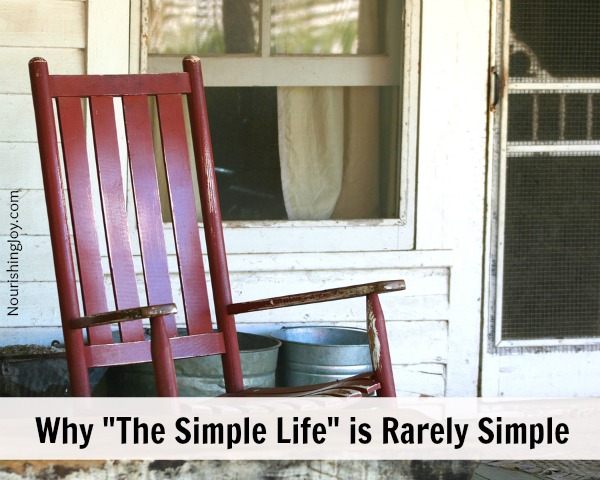Why “The Simple Life” is Rarely Simple
This post may contain affiliate links, including those from Amazon.com, which means we earn a small commission off your purchases. And here's the thing: We only mention services and products that we think are truly worth your attention, whether they're free, paid, or otherwise. This site relies on YOUR trust, so if we don't stand behind a product 110%, it's not mentioned. Period.
This article has two parts:
Part 1: Why “The Simple Life” is Rarely Simple (you are here)
Part 2: How to Make “The Simple Life” Simpler (and More Joy-Filled)
Last week I guest posted over at Keeper of the Home as part of their Real Food Made Simple series. One woman left a comment on the post that I really appreciated and that has filled my heart this week:
“…Making everything from scratch, homeschooling, cloth diapering, keeping a livable house (not clean, just decent), growing a garden, teaching Sunday school–I'm exhausted and overwhelmed. I've always loved the pioneer idea but I don't know how to find the time–and I have all the technology to speed things up.”
This comment has percolated in my mind this week – largely because I've heard the same thing from SO many others, as well as I relate SO MUCH myself.
Through all my mullings, I thought I'd share a few thoughts that bubbled to the surface. I don't have any grandiose answers – just thoughts to share.
What does “the simple life” mean to YOU?
What Is “The Simple Life”?
When I was in my early twenties, I had a bumper sticker on my car that read, “Live Simply So That Others May Simply Live.”
While this certainly evoked images of an austere life lived with purpose, it captures only part of the picture.
So what is “The Simple Life,” anyway?
For some, it's a dream of living away from the hustle and bustle of a busy city.
For others, it's self-sufficiency and not having to rely on stores to buy food and other necessities.
For others, it's life away from technology – maybe even living off the grid.
I know of others for whom “the simple life” is acknowledging the responsibility to live sustainably – that is, using only a modicum of resources – in the middle of a consumeristic, first-world society and to avoid being part of complex and corrupt economic systems.
And for those who share the sentiments of my favorite bumper sticker, it's a life lived with keen awareness of the needs of others and of the vast resources we have at our disposal.
Whatever the simple life means to you, there's almost always some element of minimizing unneeded possessions, a connectedness to the land or to nature in some way (even if it's just a balcony garden), and just a do-it-yourself kind of mentality.
Why The Simple Life Isn't Simple
When I read the Little House series as a child (and again recently with my daughter), what always captured my attention was that people worked so hard, and yet had time at the end of the day to cut out paper dolls, read, play music, and just sit together.
For women, each day had its specific task, and when that day's task was done and the daily chores were complete, there was time to do simply be.
“Wash on Monday,
Iron on Tuesday,
Mend on Wednesday,
Churn on Thursday,
Clean on Friday,
Bake on Saturday,
Rest on Sunday.”
(As an interesting side note, I've run across references that the first settlers who came off the Mayflower recited this poem as well, but instead of a day for cleaning, they had a day for brewing. Hmmm… maybe if we just made beer every week, everything else would seem simpler!)
Yet, since the rise of personal computers, cell phones, e-mail, and other ways of being instantly in touch, our time is FULL.
We also have full access via all that media to see how much others are accomplishing and we are bombarded with images of what we can have, what we can do, and what we can be. While those influences can occasionally be inspiring, most of the time they're downright dangerous.
I often feel that the only days that are truly satisfying with what I accomplish in my home and with how I connect with my children are the days I don't touch the computer. (I don't have a cell phone or TV service, but I imagine that the same would be true for those media as well.)
But considering that most of my community is with like-minded people online, that it's so easy to learn and research just by consulting my favorite search engine, and that my business is online, being off-line for very long is extremely difficult.
Time or Money? Which is more responsibly spent?
And even apart from being bombarded by all the time-filling options we have via technology, there's just a lot to do when you're living “simply.” As the old adage goes, you either spend time or money, so if you've chosen to live simply by living frugally, that pretty much means you're going to be spending time.
And like the original commenter stated, there's gardening and homeschooling and cooking from scratch and homekeeping and staying on top of all the dirty laundry and community involvement, as well as preserving the harvest when crops are ripe. There's just plain lots of work to do – and most of it gets repeated day after day after day.
So, what's the antidote?
Click here to read Part 2: How to Make “The Simple Life” Simpler (and More Joy-Filled)





Thank you so much for the post. I find myself asking the same question — “How to slow down, enjoy more, and live a simpler life?” I like your take on the different ways to interpret the phrase “living simply,” especially because lately I find that “living simply” means re-learning, or unlearning, all of my modern day habits. I am confident that all of the efforts I put in now — to learn how to cook healthy organic meals, make my own beauty products, and research the latest, etc. — will pay off in the future, but man is it a LOT of work now!
Yes, indeed! 🙂
I like YOUR definition of “living simply.” That’s a great way to think about it.
Thanks for sharing!
That Little House on the Praire bit really struck me… I’ve made oodles of charts and attempted to plan the days out to “reduce” stress… maybe what I really should be doing is planning at least one day to BREW! 🙂 Love what you give to our community. Thank you Kresha.
It’s a lot easier if we can do these things with love and not out of obligation. Prayer helps tremendously.
I could have been that commentor! I recall watching the Love Comes Softly series on DVD and thinking something along these lines, “Not only did the woman fry a chicken, she caught it, killed it, plucked it and removed its entrails BEFORE she could cook it-and still had time to visit! How is that all I have to do is cut it up and fry it, yet I don’t ever feel like I have time to just visit?
I agree that our media outlets play a large part in eating up that time. I’ve known for a very long time that I’m “addicted” to my laptop (and now my smartphone) but finally followed through with my commitment to use it less by not using it after I put my son to bed. Now I use that time to learn about herbs and aromatherapy, or plot out the details for special projects we want to do around here. My next step is to keep a list of those special things I want to look up when I am online so that I can JUST do those things, and not get lost in blogs, facebook and email.
I put off getting a smartphone because I didn’t want to pay the extra monthly bill, but I must say that having it allows me to “check in” without sitting down at the laptop and losing an hour. If we use technology wisely I think it’s a blessing, but I’ve sure been on the wrong side of that for too long!
Kelly, thanks for a very thoughtful comment. I especially love your last line: “If we use technology wisely, I think it’s a blessing, but I’ve sure been on the wrong side of that for too long!”
You’re exactly right. Technology can be SUCH a blessing – look at all the online communities that really support each other. But when it rules us, we definitely suffer the consequences.
Oh, and on the Little House list, where’s cooking, gardening, caring for animals, sewing, crafting, raising children, etc? 🙂
I loved this, Kresha. I am always busy with things to do, but whenever I see a lot on my calendar, I get overwhelmed, and feel that I’m missing out on the open schedule of work. I used to have days that I spent long hours commuting, going to school while working two jobs at a time. I don’t know how I did it, and never, ever want to go back to that. Work is good, and so are the spaces in between.
Love these posts. Do want to add one thought into the mix, though. Little House on the Prairie, et al. are romanticized versions of history and not accurate representations of everyday life “back in the day”. If you read about Laura Ingalls Wilder you will realized that she was condensing experiences and creatively depicting them for an audience of children. The simple life before many modern conveniences was often very dreary, repetitive and unhappy, for large populations. I don’t think it is healthy or in the best interest of most people to try to form or base their expectations about what constitutes a simple life based on those sources.
You are so right – and thanks for the reminder.
One only has to look through journals from previous generations (for example, my entire family has lived and farmed on the American prairies for several generations) to see the nitty-gritty details of “real life.” A visit to a natural history museum would also be of benefit to make sure we keep the rose-colored glasses at a distance.
Thanks again.
Reminds me of how we compare our own worst days with everyone else’s Pinterest-worthy days! 😉
wouldnt it be better to not use the phone or be online while your son is still awake, then using time after he is in bed to be online. that way you get to spend more time with him. thats what im trying to work on now.